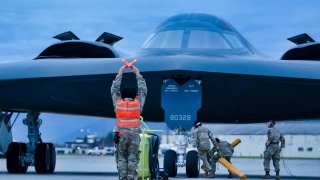Russia Is a Serious Threat in Space, But There’s No Need to Panic
We learned recently that the United States has intelligence suggesting that Russia is considering a new anti-satellite weapon of some kind. With U.S. officials providing few confirmed details, many have assumed the worst. But we should all take a step back and breathe.
We learned recently that the United States has intelligence suggesting that Russia is considering a new anti-satellite weapon of some kind. With U.S. officials providing few confirmed details, many have assumed the worst. But we should all take a step back and breathe. The theories emerging in public tend to fall into two camps: either it is a nuclear weapon in space or a nuclear-powered electronic warfare satellite. If it is a space-based nuclear weapon, this would neither be a new capability nor particularly useful to Russia. On the other hand, if it is a nuclear-powered electronic warfare satellite, that is a more concerning development.
Let’s start by reviewing what we know about this intelligence, which is not much. In a press briefing on February 16, 2024, White House National Security Communications Advisor, John Kirby, confirmed a few things: Russia is developing a new anti-satellite capability, the capability is not deployed and there is no immediate threat, and the weapon can neither attack humans nor cause physical destruction on Earth.
The other key piece of information Kirby provided is that whatever it is would violate the Outer Space Treaty (OST), a 1967 multilateral treaty that is still the basis for space policy today. The OST does not limit much in terms of military capabilities in space, but it does explicitly prohibit the placement of nuclear weapons and other weapons of mass destruction in orbit, though this does not include nuclear-powered spacecraft.
If Russia is developing a space-based nuclear weapon intended to harm other satellites, this is not a new idea or capability. We have long understood that high altitude nuclear events threaten space systems, demonstrated by United States and Soviet Union nuclear weapons testing in the early 1960s. A nuclear detonation in space produces both an electromagnetic pulse (EMP) that can instantly fry the electronics on nearby satellites and a radiation belt that would be global and damage satellites over the weeks and months that follow.
Russia certainly has the requisite nuclear and space expertise to develop and deploy a space-based nuclear weapon--as does the United States and a number of other nations. The radiation belt a weapon like this produced would have broad and indiscriminate effects against unshielded satellites in the affected orbits. It would effectively be a kamikaze attack in space because it would likely take out many of Russia’s own satellites along with whichever systems it would be targeting and the satellites of many other nations. It would be an act of desperation--much like Russia’s repeated threats to use tactical nuclear weapons in Ukraine.
It is not clear what advantage Russia would gain from placing a weapon like this in space when it could be launched from Earth if and when it is needed. Russia already has a fleet of ballistic missiles capable of boosting nuclear warheads into space on a moment’s notice, and this does not violate any treaties (until it is used) and is virtually impossible to defend against if launched on a trajectory away from the United States. Previous nuclear tests in space were all launched from Earth rather than being placed in orbit.
The other hypothesis being floated is that this is not a nuclear weapon but rather a nuclear-powered electronic warfare satellite that could be used to attack other satellites. By relying on nuclear power instead of solar power, a satellite can continuously operate without the need to recharge its batteries and without being limited in power production by the number of solar panels it can deploy. Notably, Russia has recently explored building a 1000 kilowatt nuclear reactor for satellites.
Equipping a satellite with a nuclear reactor and an electronic warfare payload could allow Russia to jam the signals between satellites and Earth or the crosslinks between satellites. Terrestrial jammers on trucks, aircraft, and ships have a much more limited range due to curvature of the Earth and their limited power sources. They are also vulnerable to attack through conventional means. The Ukrainians, for example, could drop a missile on a Russian jammer truck on the ground, but it would be much more difficult, and escalatory, to shoot down a Russian satellite doing the same thing from space, never mind the fact that Ukraine has no anti-satellite missiles.
This is a weapon that we should be concerned about because it's one that Russia could use without crossing any nuclear red lines and which would provide Russia an immediate battlefield advantage. Jamming is a reversible form of attack that does not produce any physical destruction, like space debris. Russia and others have shown a willingness to jam satellite signals, like GPS and television broadcasts, both in peacetime and in conflict. Doing it from space with a much larger power source would make these attacks much more effective and difficult to defeat.
The idea that Russia would deploy a nuclear bomb does not make much sense. It would not give Russia any new strategic or tactical advantages that it does not already have with its ground-based nuclear-armed missiles, and it would only be useful in the most dire circumstances. That Russia would want a high-powered satellite jammer in space that could target specific satellite signals and operate continuously as needed is clear. We should be more concerned about a nuclear-powered space weapon because it is a more usable form of attack--and one that is much more difficult to deter and defeat.
Regardless of what this turns out to be, we should use this opportunity to refocus attention on building more resilient and protected space systems. Threats like this are why Congress created the U.S. Space Force, after all. There are many ways to make satellites more resistant to jamming and other forms of attack. It is also an opportunity to redouble efforts with our allies to develop a range of plans for what we would do both before and after an attack in space. Our collective words and deeds should make clear to Russia that attacking our space systems is not in its interests.
About the Authors
Todd Harrison is a senior fellow at the American Enterprise Institute, where he focuses on defense strategy and budgeting, the defense industrial base, and space policy and security.
Clayton Swope is the deputy director of the Aerospace Security Project and a senior fellow in the International Security Program at the Center for Strategic and International Studies (CSIS).


